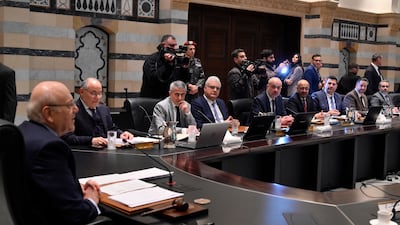Lebanon’s caretaker cabinet on Wednesday approved a $116 million treasury advance to pay for production and maintenance of the state's collapsing energy sector — a boon for residents relying on costly generator subscriptions in the absence of state electricity.
The advance is part of an emergency workaround proposed by the country's caretaker energy minister to jump-start the electricity sector, which has provided near-negligible amounts of electricity since Lebanon's economic downfall three years ago.
It will cover $62 million for 66,000 tonnes of diesel fuel and $54 million for the maintenance of power plants.
But the release of a further $184 million will be contingent on the formation of a ministerial committee to which Lebanon’s state energy company, Electricity Du Liban, must report periodically.
Minister of Energy and Water Walid Fayad, who boycotted the session for "constitutional reasons" although the plan approved was his own initiative, called the green light on the treasury advance "a half victory."
"This is just a morphine dose," he added. "It's supposed to be a holistic plan."
His proposal to obtain a $300 million Treasury advance was a scaled-down version of the emergency electricity plan proposed in November, which had called for double that amount to cover Lebanon's state electricity needs for five months, providing six to eight hours of electricity per day. The revenue generated during tariff collection would help the Energy Ministry return the advance to the central bank, creating a rolling line of credit.
The approval of even half the requested advance is “more positive than it is negative,” Dr Fayad told The National.
Lebanon's state-provided electricity sector is in a shambles amid financing troubles and political deadlock, which has prevented Dr Fayad’s previous electricity plan from taking effect. The unsuccessful November plan sought Central Bank financing to cover the price of costly fuel imports to power energy plants. But it reached a stalemate after rival political parties’ disagreed on whether a caretaker government could convene to approve the loan, in the absence of a president.
Wednesday's session was boycotted by the Free Patriotic Movement and its allies, including Dr Fayad, on the premise that a resigned government cannot convene constitutionally in the absence of an elected head of state.
Following the end of president Michel Aoun's term in October, Lebanon was left without a president and only a caretaker cabinet with limited powers.
But with the deeply divided parliament unable to agree on a candidate, the presidential vacuum appears set to continue, foreshadowing further state paralysis — and leaving Lebanon’s residents deprived of basic goods and services while its politicians contend for control.
“Again and again we see how people suffer as a result of this political bickering,” said Dr Sami Atallah, founding director of Lebanon-based think tank The Policy Initiative.
Dr Atallah blamed Lebanon’s sectarian power-sharing system for hampering the development of the struggling nation, which has been embroiled in a steep economic crisis since 2019. The financial crash, referred to as a "deliberate depression" by the World Bank, is widely blamed on the corruption and negligence of Lebanon’s political class.
Dr Fayad said he proposed the plan as a workaround to attending cabinet sessions, which he deems unlawful, by drafting four decrees for the Treasury advance, which ministers could countersign without a full cabinet being required.
He said $300 million was the minimum amount needed to kick-start the process and create a rolling credit line.
"I had sent them a very clear timetable," an audibly frustrated Dr Fayad told The National.
However the funding to power plants was secured, Lebanon’s residents will welcome the addition of a few hours of state electricity per day. They have been dependent on expensive shared generator networks since the end of the country’s 1975-1990 civil war, when the national power infrastructure was devastated.
Where once they switched on for a few hours a day to fill gaps in state electricity provision, generators are now a primary source of power for most households due the rarity of state electricity since Lebanon’s economic crisis began.
But generators are expensive and can only provide limited power. Those who can afford generator subscriptions have become accustomed to switching off the water heater to do laundry, or turning off the fridge to turn on the air conditioning.
Mervat Amand, a 55-year-old homemaker in Choueifat, said her household had been forced to adapt in the absence of state electricity. During the winter months, they boil water on the stove to take warm showers, her son showers in his gym when he can and they gather around a kerosene heater instead of turning on their wall-mounted heater, she said.
“We even changed the kind of washing machine we use. Now we have one that uses less water and less electricity,” she told The National.
Ms Amand said she doubted that additional state electricity would manifest tangibly.
"They've promised all that before," she said.
Dr Fayad told The National it was uncertain how much electricity would be generated with just half of the requested treasury advance.
"Maybe around four to five hours,” he predicted, warning that if a committee to unlock the remaining funds was not created quickly, the fuel would “not last longer than a month.”


